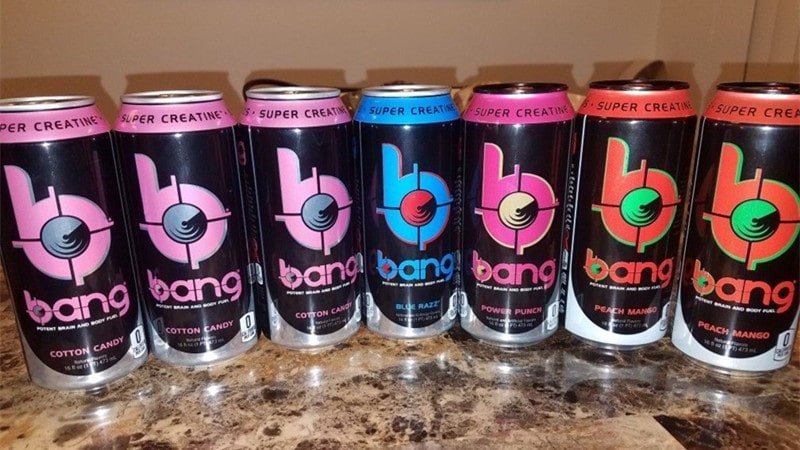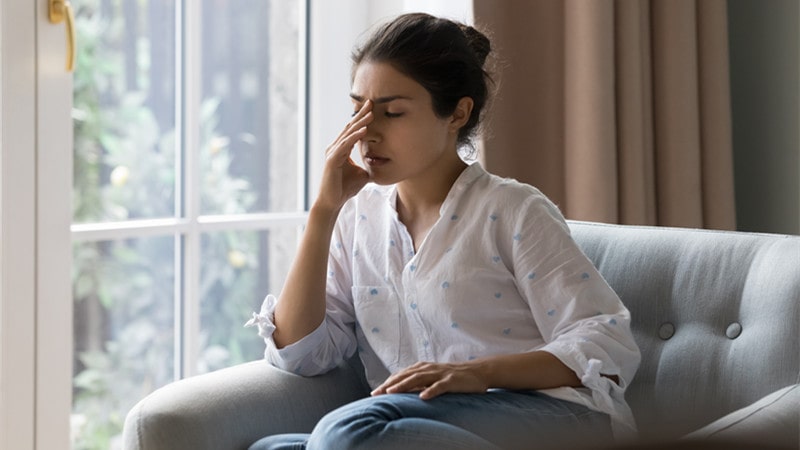Nothing does the job of a caffeine-loaded energy drink like Bang to keep you going all night for a study session, concert, or training. Energy drinks are also massively popular among working adults these days because their workaholic lifestyles can be quite draining.
However, if it were that convenient to restore your energy to keep working longer, why doesn’t everyone use Bang? If you want to know “are Bang energy drinks bad for you”, this informative piece will explain everything you need to know about the health and safety concerns associated with Bang.
What Are Bang Energy Drinks?
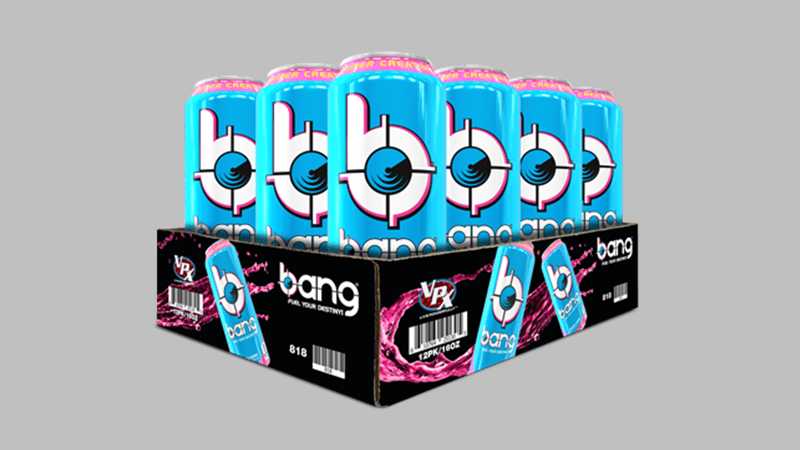
Image source: Pinterest
VPX Bang is an American brand of energy drinks owned by Vital Pharmaceuticals, a pharmaceutical corporation located in Florida, USA. Bang energy drinks are available in multiple flavors such as Bangster Berry, Cotton Candy, Strawberry Crisp, and Miami Cola.
They’re frequently marketed to health-conscious customers as a zero-sugar substitute to common caffeinated beverages like Monster and Redbull. That being said, according to a 2021 Statista Report, VPX Bang still came in third behind Monster and Redbull in sales. It did, however, surpass the sales of Redbull’s sugar-free and summer edition.
What Is in Bang Energy Drinks? (Major Ingredients)
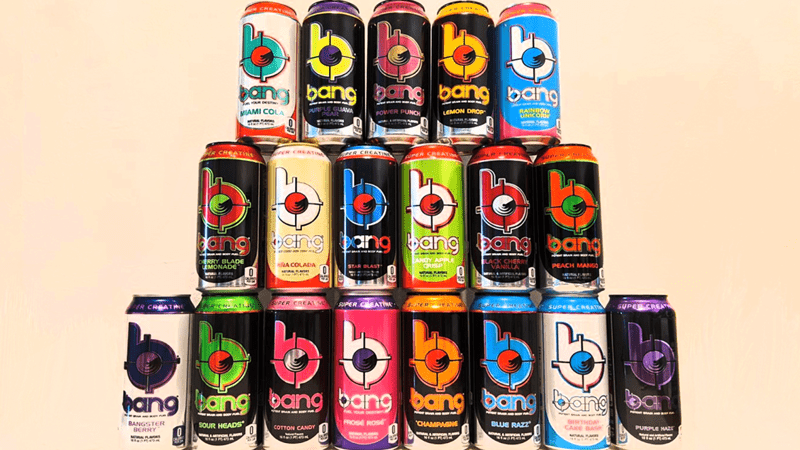
Image source: Pinterest
Most variations of Bang have an extreme caffeine strength, with at least 300 mg of caffeine per 16 oz. can. The only exception is Bang’s Natural Mango Bango with 250 mg. To put that into perspective, one can of Bang gives you close to four cups of espresso’s worth of energy.
A 1 can (16 oz) serving of Bang Energy contains:
• 0 calories
• 0 grams of fat
• 0mg of cholesterol
• 40mg sodium
• 85mg potassium
• 0 grams of carbohydrate
• 0 grams of fiber
• 0 grams of sugar
• 0 grams of protein
• 50% DV of vitamin C
• 25% DV of niacin
• 25% DV of vitamin B6
• 25% DV of vitamin B12
• 2% DV of magnesium
Additionally, Bang also contains the following BCAAs, which is short for branch-chain amino acids.
• Super creatine (Creatyl-L-Leucine)
• CoQ10
• L-leucine
• Carbonated water
• Sucralose (Artificial sweetener)
• Magnesium chloride
• Calcium chloride
• Citric acid anhydrous
• Caffeine anhydrous
• Sodium benzoate
• L-valine
• Potassium sorbate
• Calcium disodium EDTA
• Acesulfame potassium
Multiple studies have linked BCAAs to increased muscle protein synthesis, reduced muscle soreness, reduced fatigue, and benefits for people with liver disease.
Are Bang Energy Drinks Safe?
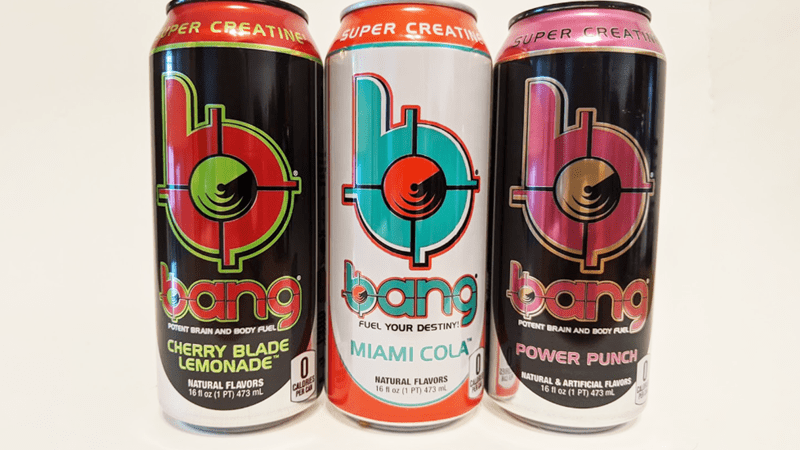
Image source: Pinterest
Bang energy drinks are completely safe to consume for most people. However, according to the label, the following people may be at risk from consuming Bang energy:
#1. Under 18
#2. Pregnant mothers
#3. Nursing mothers
#4. People on prescription drugs (always check with your doctor)
#5. People with allergies to any of the ingredients
Are Bang Energy Drinks Bad for You?
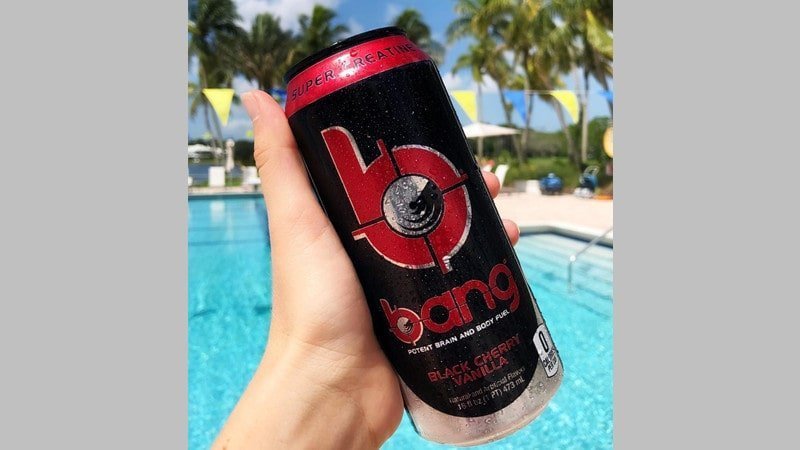
Image source: Pinterest
Safe doesn’t always mean good. A single cigarette never killed anyone, but smoking addiction has killed millions of people and reduced the quality of life even more. Similarly, there are some safety concerns with the overconsumption of Bang. To start with, it has an ungodly amount of caffeine.
According to a study published in the Journal of Caffeine Research, caffeine is one of the most addictive substances on the planet, with a dependence ratio of 28%. This was right behind alcohol’s 50% and nicotine’s 80% dependence ratios.
This means you have a 28% chance of experiencing a strong dependency on caffeine from a few days of consuming Bang. Dependency is often experienced in the form of cravings, inability to function, and mood swings without your daily caffeine fix. So, why is that dangerous?
Did you know that caffeine is one of the most toxic substances on the planet? According to Medical News Today, a concentration of 80 to 100 mg for every liter of blood can be fatal. However, caffeine overdose is very rare because beverages are strongly regulated to moderate the dose. A 2018 worldwide survey published by Nutrients found 92 cases of death reported from caffeine overdose.
So, you may not have to worry about dying, but caffeine consumption reaches toxic levels when you consume too much in a short time and can cause several unpleasant side effects like headaches, irritability, nausea, and vomiting. In severe cases, it may cause abdominal pain, seizures, elevated or irregular heart rate, an increase in blood acidity, and reduced blood supply to the heart.
Developing a caffeine addiction can diminish the quality of one’s health, and by extension one’s life. Caffeine addiction increases the risk of the following health concerns:
• Cardiovascular anomalies
• Cognitive underdevelopment in young adults
• Anxiety and depression
• Sleep disorders
• Digestive problems
• Dehydration
While Bang energy drinks give you a pass on carbs, sugar, and calories, the amount of caffeine they contain warrants caution. The best approach is to consume the beverage in moderation and consult your doctor to ensure that you don’t have any conflicting allergies or medications.
Is Bang Healthier Than Monster?
Pepsico describes Bang as a revolutionary energy drink because it’s made with zero carbs, zero calories, zero sugars, and provides a clean supply of caffeine and essential amino acids. Given that Monster is rich in sugar, unhealthy fat, and calories, Bang is definitely the healthier choice.
Pros And Cons of Bang Energy Drinks
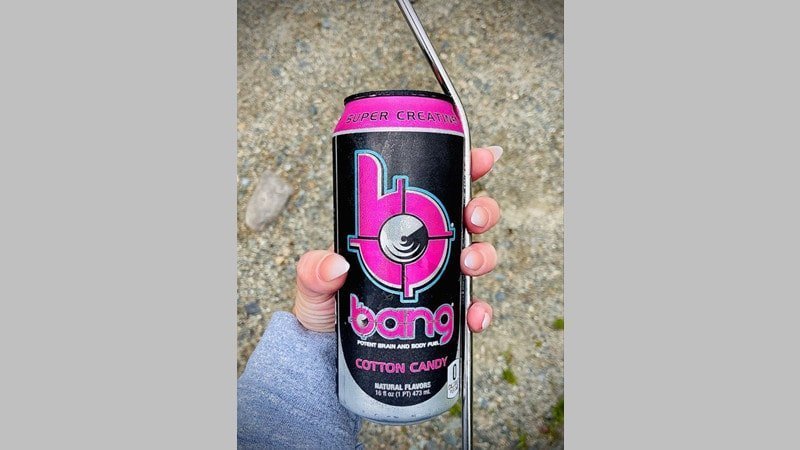
Image source: Pinterest
Here are some of the pros and cons of Bang energy drinks for you to compare.
Pros:
#1. Boosts energy, giving you increased performance levels.
#2. Improves endurance levels by replenishing the electrolytes necessary for your nerve and muscle function.
#3. The presence of BCAAs can help you achieve muscle growth faster if you’re training. It also reduced soreness and fatigue.
#4. Sugar-free and calorie-free so you do not have to worry about weight gain.
Cons:
#1. Risk of caffeine toxicity from overconsumption.
#2. Hinders sleep and cause irritability.
#3. Can be harmful to your nervous system.
Featured image source: Pinterest.com

